My personal path to understanding the value of therapy during my own challenging times.
“What does a counsellor know that I don’t?” That’s a question I asked myself before starting therapy: my exact words were “What can some counsellor do for me that I can’t do for myself?”
Recognizing a need for help
I mean, things looked ok on the surface. My wife and I had been together since high school, some three decades. We have three beautiful daughters, and have been extremely fortunate in our quality of life. And yet in mid-life I found myself in a relationship crisis, a situation for which I had no easy answers, and which was the darkest and most painful period of my life. I was reluctantly able to concede that I needed help; I had to face the fact that whatever I was doing wasn’t working for me or anyone close to me.
You see, I have spent much of my life energy trying to manage anxiety. It was like a smoke alarm constantly whistling in my head; there were times when it was barely audible, and others when it would scream in panic. Anxiety was the context in which I viewed my day: I didn’t know any different, only that the level fluctuated. Somewhere in my boyhood I developed a hyper-vigilance to spot potential anxiety-provoking situations and automatically adopted strategies to cope. When I entered counselling as an adult, I had few words for my experience: I just knew I couldn’t remember many extended periods of being comfortable in my own skin.
The process of managing anxiety is mostly unconscious. I don’t remember thinking “Wow, I have pretty low self-esteem and am afraid other people will see that, so I had better get good grades and get people’s approval and obsess about health and spirituality and act out by attracting other women into my life. Oh and I should do all of that and take pains to appear ‘well-adjusted.’”
When trying to manage anxiety leads to more pain
The tragic paradox of anxiety is that the unconscious attempts to manage it by avoiding or numbing is of course that those behaviours just exacerbate our pain: it ends in a cycle of addiction to seeking a state of temporary relief. There are endless ways to find temporary relief from psychic pain, and they all represent a need to exert control.
We may ‘act out’ with aggression, passive-aggression, affairs, conflict, or gossiping. Or we ‘act in’ with eating disorders, or addictions to substances, sex, work, screen, exercise, or any behaviour that has the conscious or unconscious intention of numbing or avoiding unwanted feelings. I tried many of these, resulting in deep personal crisis.
It is with enormous gratitude that I find myself today living a life with a great sense of balance, depth of feeling, and purpose; this miracle is the result of the trust and support of my wife and family, of my own willingness to change, and the compassion and acceptance of my counselors and mentors. As a counselor, I am no longer afforded the luxury of merely ‘talking about’ healing, but have to ‘be’ that healing. While that sounds a bit lofty, it is a fantastic way to live. This shapes my mission – to help my clients make sense of their experience, to help them become aware of and integrate the dis-integrated aspects of their lives in order to make healthy choices moving forward.
Observing myself through a frame of curiosity
I came to change my life for the better by learning to foster curiosity and by becoming a student of my own life, as opposed to trying to micro-manage my relationships and exert control over my external world. Instead of avoiding or numbing I had to face my anxiety and move through it. Believe me it was the last thing I wanted to do, for unconsciously I believed I might discover that my worst fears about myself were true. Who the hell wants to risk that? It never occurred to me that what lay on the other side of this rigorous self-reflection could be anything but terrifying, let alone liberating, peaceful, or joyous.
So what is the process of counselling and what does a good counsellor offer?
Counselling is a process of illumination and integration.
An overwhelming body of evidence of clinical meta-studies shows that positive personality change (meaning the reduction of rigid self-inhibiting patterns of behaviour, and self-reports of life satisfaction) is affected by two factors:
- the client’s own willingness to change, and
- the quality of the therapeutic relationship.
I found that my own willingness to change actually increased as I progressed in counseling, for I was having a new experience of life, and liking that new trajectory. In other words, in the nurturing environment of individual and group sessions I was having an experience of myself and others that was connective, life-affirming, and frankly exciting!
So counselling sessions are a place to:
- practice ‘being known’ by another human being,
- uncover our guilt or shame, and
- risk sharing the vulnerable parts of ourselves.
Guided curiosity
A counsellor is trained in helping us take a wider view of our thoughts, feelings and behaviours by putting them in context of the larger backdrop of our life experience. Therapy can help us recognize rigid life-patterns, and to help us become curious about their origins, the intended purpose of those patterns, and the resultant impact on our life. This curiosity is the fertile ground on which we can begin to plant the seeds of values-directed living, opening us up to new possibilities for building relationship with ourselves and our past, and for connecting with others there.
The science behind counselling
That’s the integration part, and that’s not just ‘therapy speak.’ Counselling sessions help you literally grow new neural pathways between parts of your brain that are not necessarily on speaking terms! Daniel Siegel calls this ‘mindfulness,’ which in simple terms is the process of integrating the parts of your brain/body that produce and store emotion with the parts that do the rational processing: it is the process of becoming aware that we are aware.
But here’s the catch: true personal growth comes in relationships, for that is where our initial struggles were born: we have to have the experience of being vulnerable, of being known in an undefended, authentic state, and being met there. While meditation certainly helps calm, focus, and attune the body/mind to its own processes, interpersonal interactions of empathy and attunement are the key to deep positive change.
We need each other. Attachment theory shows us that we thrive on the nurturing touch of and eye contact with our caregivers, in our mutual attunement and empathy, and this need to connect lasts through our lifetime: this need is adaptive, for we did not survive as a species by being rugged individualists.
My experience
 I had connective experiences in counseling. I was met and accepted there, which gave me the courage to risk bringing myself more fully to my ‘real’ life. Cautiously, I began to practice this with my wife, and my family, my parents and friends. I was frankly terrified to reveal myself in every new vulnerable interaction, yet this was my ‘edge,’ and it was at my edge that I encountered my most profound growth. I carried toxic guilt and shame, and was able to learn accountability for my actions without having to be perfect, or look ‘together,’ or say all the right things.
I had connective experiences in counseling. I was met and accepted there, which gave me the courage to risk bringing myself more fully to my ‘real’ life. Cautiously, I began to practice this with my wife, and my family, my parents and friends. I was frankly terrified to reveal myself in every new vulnerable interaction, yet this was my ‘edge,’ and it was at my edge that I encountered my most profound growth. I carried toxic guilt and shame, and was able to learn accountability for my actions without having to be perfect, or look ‘together,’ or say all the right things.
I got curious too: where did I learn to manage my emotions, how had growing up in my family influenced my thoughts and feelings, and who had been my models for managing life struggles? We looked at my larger family system to see me in the context of the larger emotional unit, and it opened my eyes to the systemic struggles and passions that are the living crucible in which I came into the world.
It turns out anxiety was a blanket term for the thoughts and feelings I had about myself; it is a physical feedback loop perpetuated by old information and reactive tendencies. The good news is that the loop slows and dissipates under compassionate investigation.
And I finally began to ask the deeper questions: What if I am ok? What if I’m enough? Who am I, and who will I choose to be in the middle of my life?
Counselling brings a richness to life choices
So therapy is about learning to tolerate anxiety: we don’t get to erase it, we get to have a new relationship with it. And with time and work and gentle attention anxiety lessens, becomes quieter, less threatening; and in a wonderful irony of the universe the more love or compassion we offer it, the less we lose ourselves to it. It becomes a source of rich lessons on our journey to living a life of purpose, peace, and self-acceptance.







